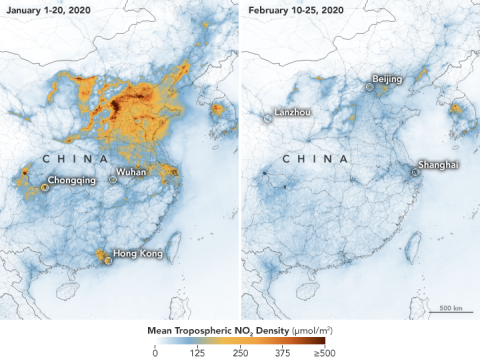Note: Yale School of the Environment (YSE) was formerly known as the Yale School of Forestry & Environmental Studies (F&ES). News articles and events posted prior to July 1, 2020 refer to the School's name at that time.
 From January to February, NASA and European Space Agency pollution monitoring satellites detected significant decreases in nitrogen dioxide over China. The change was at least partly related to the economic slowdown following the outbreak of coronavirus.
From January to February, NASA and European Space Agency pollution monitoring satellites detected significant decreases in nitrogen dioxide over China. The change was at least partly related to the economic slowdown following the outbreak of coronavirus.
The paralytic effect of the COVID-19 threat on human activities has triggered a steep decline in energy use worldwide, grounding airlines, keeping motorists off roadways, and grinding industry to a halt.
 Kenneth Gillingham
Kenneth Gillingham
But while this monumental shift has had dramatic short-term environmental implications — including steep emissions reductions in some of the hardest-hit regions — the dire effects on global energy markets could stall important progress in the development of clean energy technologies, including electric vehicles, said Kenneth Gillingham, an associate professor of environmental and energy economics at the Yale School of Forestry & Environmental Studies.
We caught up with Gillingham to discuss the environmental implications of this global threat and its potential long-term effects on both global energy markets and individual consumer behaviors.
The COVID-19 threat has obviously had an incredibly disruptive effect on the global economy (largely because it's keeping so many people at home rather than commuting to work or going out for recreation). Is there any early data on how this is affecting the energy economy?
Kenneth Gillingham: It's still on the early side, but the unfortunate massive disruptions that we are seeing have already been leading to a massive drop in gasoline and oil demand, which led Russia and Saudi Arabia to fail to come to an agreement during the last OPEC meeting, thus allowing oil prices to drop to the lowest price in years. For comparison, the price today is below $25 per barrel, which is less than half of what it was just a few weeks ago, and it reached over $140 per barrel at the peak in 2008. This is a real problem for the oil patch. But, at the same time, supply chains in other areas, such as solar photovoltaics and wind turbines, are being disrupted, as they are highly globalized. And many households are cancelling their residential rooftop solar photovoltaic installations out of fear of Covid-19.
So, overall investment in energy markets will be dropping. Electricity demand is also dropping, with commercial and industrial demand dropping more than residential demand due to people working from home. But the drop in electricity demand will not be nearly as substantial as the decline in oil demand from reduced travel.
How is this pandemic affecting global emissions?
Gillingham: There is clear evidence that this pandemic is reducing local air pollutant emission from dramatically reduced travel in many areas. There may be some compensating emission increases from people heating or cooling their homes more, so the net effect on greenhouse gas emissions may not be quite as dramatic. But, the satellite imagery of reduced pollution in China and Italy are pretty striking. The early imagery I’ve seen of Seattle and Los Angeles suggests similar reductions in the United States, too.
What might the long-term impacts of this be? What if this goes on for many weeks or months?
Gillingham:If we manage to find a way out of this crisis in the near future, I do not anticipate that the long-term impacts will be very substantial. However, if it goes on for many weeks or months, we will likely fall into a deeper recession, as many companies will go out of business and it will take quite a bit of time to get back the same level of economic activity. This will be unfortunate for many reasons, but a silver lining is that it will likely mean lower emissions.
That said, it would also mean a slowing of the transition we are seeing now to renewables and electric vehicles, as investment in new technologies requires income and confidence in the economy. This slowdown may mean greater reliance on fossil fuels for longer.
So much of your work is focused on how peer behaviors impact energy decisions and personal behavior. While environmental impacts are not the motivating factor right now, what indicators might you look at to gauge whether our experiences during the COVID-19 pandemic affect societal choices moving forward?
Gillingham: Most broadly, I will be interested in to see whether people’s energy conserving habits continue during and after this time. These circumstances raise a variety of questions. Do people still recycle and turn off lights? With people working from home more often, how will they adjust their thermostats? And how will any changes to habits made during this time affect energy behaviors going forward?
We caught up with Gillingham to discuss the environmental implications of this global threat and its potential long-term effects on both global energy markets and individual consumer behaviors.
The COVID-19 threat has obviously had an incredibly disruptive effect on the global economy (largely because it's keeping so many people at home rather than commuting to work or going out for recreation). Is there any early data on how this is affecting the energy economy?
Kenneth Gillingham: It's still on the early side, but the unfortunate massive disruptions that we are seeing have already been leading to a massive drop in gasoline and oil demand, which led Russia and Saudi Arabia to fail to come to an agreement during the last OPEC meeting, thus allowing oil prices to drop to the lowest price in years. For comparison, the price today is below $25 per barrel, which is less than half of what it was just a few weeks ago, and it reached over $140 per barrel at the peak in 2008. This is a real problem for the oil patch. But, at the same time, supply chains in other areas, such as solar photovoltaics and wind turbines, are being disrupted, as they are highly globalized. And many households are cancelling their residential rooftop solar photovoltaic installations out of fear of Covid-19.
So, overall investment in energy markets will be dropping. Electricity demand is also dropping, with commercial and industrial demand dropping more than residential demand due to people working from home. But the drop in electricity demand will not be nearly as substantial as the decline in oil demand from reduced travel.
How is this pandemic affecting global emissions?
Gillingham: There is clear evidence that this pandemic is reducing local air pollutant emission from dramatically reduced travel in many areas. There may be some compensating emission increases from people heating or cooling their homes more, so the net effect on greenhouse gas emissions may not be quite as dramatic. But, the satellite imagery of reduced pollution in China and Italy are pretty striking. The early imagery I’ve seen of Seattle and Los Angeles suggests similar reductions in the United States, too.
What might the long-term impacts of this be? What if this goes on for many weeks or months?
Gillingham:If we manage to find a way out of this crisis in the near future, I do not anticipate that the long-term impacts will be very substantial. However, if it goes on for many weeks or months, we will likely fall into a deeper recession, as many companies will go out of business and it will take quite a bit of time to get back the same level of economic activity. This will be unfortunate for many reasons, but a silver lining is that it will likely mean lower emissions.
That said, it would also mean a slowing of the transition we are seeing now to renewables and electric vehicles, as investment in new technologies requires income and confidence in the economy. This slowdown may mean greater reliance on fossil fuels for longer.
So much of your work is focused on how peer behaviors impact energy decisions and personal behavior. While environmental impacts are not the motivating factor right now, what indicators might you look at to gauge whether our experiences during the COVID-19 pandemic affect societal choices moving forward?
Gillingham: Most broadly, I will be interested in to see whether people’s energy conserving habits continue during and after this time. These circumstances raise a variety of questions. Do people still recycle and turn off lights? With people working from home more often, how will they adjust their thermostats? And how will any changes to habits made during this time affect energy behaviors going forward?
– Kevin Dennehy kevin.dennehy@yale.edu 203 436-4842
Published
March 23, 2020